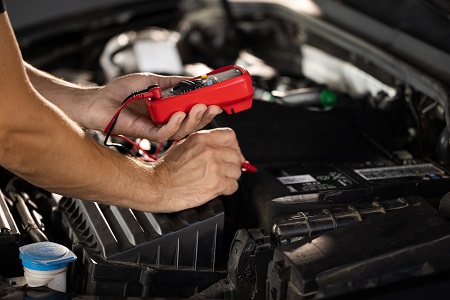You’re probably wondering, ‘How long do car batteries last?’ It’s a critical question, as you depend on your car daily.
Many factors contribute to a battery’s lifespan, including type, maintenance, and driving habits. Understanding these can help you maximize your battery’s longevity.
So, let’s delve into this intricate world of car batteries, giving you the lowdown on what affects their durability and when you’ll likely need a replacement.If you are in need of reliable and efficient Audi, VW, Porsche or Subaru repair services, Trafton’s Foreign Auto is the ideal choice. With our expertise in foreign auto repair and extensive experience in handling German vehicles, you can trust us to provide exceptional service and ensure your vehicle is running smoothly. Additionally, Trafton’s Foreign Auto specializes in battery replacement, making us the go-to destination for all your car maintenance needs.
Understanding Car Battery Lifespan

It’s not just about the age of the battery; various elements can shorten or extend its life.
Temperature plays a significant role; excessive heat accelerates the chemical operation within the battery, resulting in shortened life.
Vibration can also be detrimental, as it can cause internal damage and short circuits.
The way you drive your car matters, too; frequent short trips can prevent full charging, leading to sulfate buildup on the lead plates.
Moreover, the overall electrical load can drain your battery over time; numerous power-hungry accessories and infotainment systems can draw more current than the alternator can replenish, straining the battery.
A weak charging system will cause your battery to not only drain, but can also cause your battery never fully recover.
Over charging and excessive jump box usage is hard on your battery. A battery should be restored with long term low amperage charging when attempting to restore. AGM batteries, which are used in most late model VW, Audi, and Porsche, should use a specific charger with an AGM charge option.
Vehicles with keyless ignitions should absolutely be registered to the vehicle via offboard computer. Without this procedure, the battery may fail prematurely, and even worse, the charging system could experience incorrect load causing premature failure.
Regular maintenance is key to maximizing battery longevity.
Factors Influencing Car Battery Longevity
You’ll find that temperature fluctuations and your driving habits are significant factors influencing car battery longevity. Constant exposure to high temperatures can accelerate the corrosion process within the battery, causing it to fail prematurely. Conversely, extremely cold conditions can reduce the battery’s cranking power, making it harder for your car to start.
Your driving habits also play a crucial role. Frequent short trips don’t allow the alternator enough time to recharge the battery fully, leading to a gradual decline in battery performance. Overuse of electrical accessories when the engine isn’t running can also drain the battery, reducing its lifespan.
Regular maintenance checks, managing accessory use, and parking in temperature-controlled environments can help optimize battery health. Understanding these factors is crucial to maximizing your car battery’s service life.
Types of Car Batteries and Their Durability
With so many options on the market, it’s crucial to understand the different types of car batteries and their respective durability before making a purchase.
- Lead-Acid batteries, being the most common, typically last 3-5 years, but their life span can be shortened by frequent short drives and other variables.
- Absorbed Glass Mat (AGM) batteries, designed for vehicles with stop-start systems, convertibles, and many performance vehicles, can last up to 4-6 years. However, they’re more sensitive to overcharging.
- Lithium-ion batteries, found in electric and hybrid cars, can last up to 10 years, but they require special care to maintain their performance. Lithium-ian batteries are starting to be used in newer model vehicles.
- Auxiliary batteries, typically lead-acid, are used in many late model German cars as backup power to maintain memory in the vehicles modules to avoid communication faults and other vehicle computer/module memory losses.
Understanding these differences allows you to make an informed decision based on your vehicle’s needs.
Signs of a Dying Car Battery
Warning lights such as a charging error or check engine light can be a telltale sign that your car battery’s on its last legs. Low voltage faults can cause erratic behavior with your vehicle’s electronics that could make you think that there is a much bigger issue than a charging system or battery fault.
If your car’s electrical components seem to be working less effectively, it could be due to sulfation buildup on your battery’s lead plates. This process reduces the battery’s capacity, affecting its performance.
Similarly, if you’re experiencing slow or troubled engine starts, it’s likely your battery’s struggling to provide the required cranking amps. Another indicator is a swollen battery case, which signifies excessive heat destroying your battery’s internal components.
Don’t ignore the check engine light or battery warning light either; it’s often the first warning of battery issues. Remember, preventative maintenance and regular inspections ensure optimal battery health and prolong its lifespan.
Regular Battery Maintenance for Longer Life
To maximize your car’s battery life, it’s imperative that you practice regular maintenance and always keep an eye out for signs of wear and tear.
Regularly inspect the battery terminals for any corrosion. It’s a primary culprit that impedes the flow of current – a symptom known as high resistance.
You should also ensure the battery is securely fastened, as vibrations can lead to internal damage and short circuits.
Additionally, regular checks of the electrolyte level are crucial, particularly in non-sealed batteries. A low level can expose the plates, leading to sulfation and decreased capacity.
Lastly, have your technician perform load tests and charging tests to assess battery health and alternator output. This measures the battery’s ability to deliver current relative to its rated capacity, indicating potential failure. The alternator output tells you if the battery is getting proper charging voltage. Voltage on a healthy charging system typically ranges from approximately 13.8v to 14.8v.
Impact of Driving Habits on Battery Life
You’re not only affecting your car’s fuel efficiency with your driving habits, but you’re also impacting the battery life. Frequent short drives prevent the battery from fully charging, leading to sulfation, a buildup of lead sulfate crystals that can reduce battery capacity and lifespan.
Leaving auxiliaries plugged into your car such as phone chargers, radar detectors, LED lights and other aftermarket accessories, in some vehicle makes and models can cause your battery to drain prematurely.
Similarly, allowing your car to idle for extended periods can contribute to sulfation and reduce the battery’s effectiveness. Consistent undercharging leads to ‘acid stratification’. In layman’s terms, this is when the electrolyte’s heavy acid settles at the bottom, causing corrosion and reducing battery life.
When to Replace Your Car Battery
Often, you’ll notice signs of a failing battery and need to replace it, but sometimes it’ll just die without warning. Look for symptoms such as a slow engine crank, dim headlights, or a check engine light.
Your battery’s lifespan can be influenced by factors like your driving habits, weather conditions, and the vehicle’s electrical load. Generally, it’s recommended to replace car batteries every 4-6 years. However, you should conduct regular voltage tests, ideally bi-annually, to monitor your battery’s health. A reading below 12.4 volts while static indicates it’s time for a replacement. Also, a failed load test will indicate it is time for a replacement battery.
Trust Trafton’s Foreign Auto for All Your Volkswagen, Audi, Porsche and Subaru Repair Needs
Whether it’s your VW’s charging light or your Subaru timing chain, you can always trust Trafton’s Foreign Auto for reliable repairs and exceptional service. Our highly skilled technicians specialize in servicing and repairing foreign vehicles, ensuring your car receives the utmost attention and expertise.
Here’s why you should choose our auto repair expert team:
- Exceptional Service: We’re committed to providing excellent customer service.
- Quality Workmanship: We guarantee high-quality repairs, from routine maintenance to complex issues.
- Excellent Warranty: Our parts and labor are guaranteed for 2 years 24,000 miles on most makes and models.
- Location: We’re conveniently located in Portland.
- Community Engagement: We’re a trusted, locally-owned business.
Contact us for exceptional customer service.
Auto repair services we provide:
- Maintenance Services
- Engine Light Diagnosis
- Battery Service
- Brake Repair
- Transmission Repair
- AC Repair
- Cooling System Repairs
- Engine Repair
- Clutch Replacement
- Maintenance Services
- Oil Changes
- And More
Visit our About Us page for more information about our auto repair shop.

